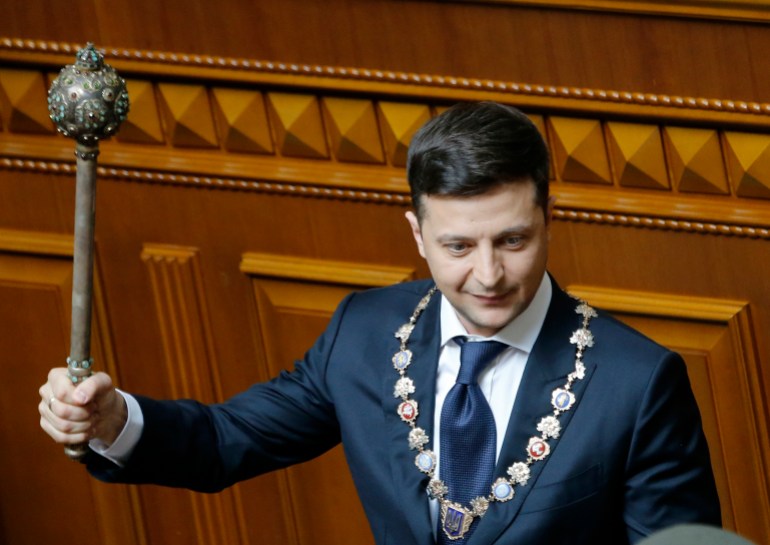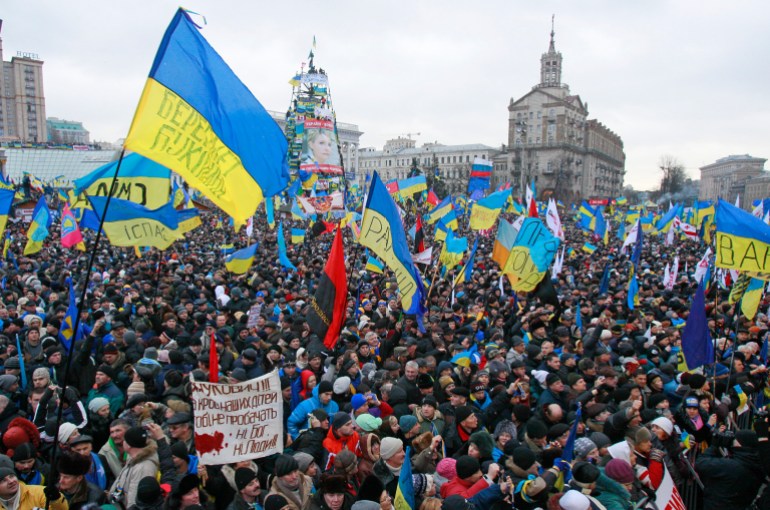How much of a problem is corruption in Ukraine?
Analysts say that Ukraine has long suffered from systemic corruption but that Russia, which often weaponises the issue, is in no position to judge.
![[AP]](/wp-content/uploads/2022/06/AP22057143694701-13.jpg?resize=770%2C513&quality=80)
Three years ago, on May 20, 2019, Volodymyr Zelenskyy, with a hint of irony, said in his inauguration speech that his election victory proved that Ukrainians were tired of experienced politicians who over the past 28 years had created a country of opportunities – “opportunities to steal, bribe and loot”.
The former comedian, who promised to tackle corruption in his campaign, added: “Let’s build a country of other opportunities. Where everybody is equal before the law and where the rules of the game are honest and transparent, that are the same for everyone.”
Keep reading
list of 4 itemsJacob Zuma corruption trial postponed pending latest appeal
Myanmar’s Aung San Suu Kyi sentenced to jail for corruption
Kyrgyzstan arrests health minister for alleged corruption
Ukraine has long been associated with corruption and oligarchy and Russia has used these talking points to partially justify its war against the country.
However, analysts say that Ukraine today has made significant strides to root out corruption as they note Russia is in no position to criticise.
According to Transparency International’s 2021 Corruption Perceptions Index, Ukraine ranked 122nd out of 180 countries, near countries such as Zambia, Gabon and Mexico, while nations like Denmark and Finland ranked first.
That year, Ukraine was the second most corrupt in Europe. Russia was the most corrupt at 136.
But according to Koen Slootmaeckers, senior lecturer in international politics at City, University of London, “we need to be very careful on how we discuss the issue of corruption in Ukraine as if we are not, we only add to the Russia propaganda narrative which uses corruption as a justification for its own aggression.
“This is particularly the case when we start this conversation by comparing Ukraine to African countries where Western powers often use corruption to continue subordinating African nations and put them under special measures and development aid conditionality,” he told Al Jazeera.

While there is little doubt corruption has troubled Ukraine’s society and political landscape, everyday Ukrainians have repeatedly stood up against government wrongdoing and called for the rule of law, democracy and self-determination, such as during the Orange Revolution in 2004 and the pro-European protests of the Euromaidan movement some 10 years later.
The Orange Revolution was a series of strikes and protests linked to allegations of vote-rigging in favour of Viktor Yanukovych, a pro-Russian candidate in the 2004 presidential election.
The Euromaidan in 2013-2014 was the result of the then-government’s decision not to sign the European Union-Ukraine Association Agreement with the bloc. Those protests ended with Yanukovych’s resignation.
“When it comes to Ukraine, the Euromaidan revolution was largely sparked by a desire to change the political regime and tackle the issue of corruption in Ukraine,” said Slootmaeckers.
Legacy of Soviet Union
But Ukraine experienced widespread systemic corruption long before the Yanukovych era.
Bribes or “gifts” were common in the public system. Ukrainians would have to resort to bribing officials to get better access to public services, such as education or healthcare, or to prevent being denied them.
“Unfortunately, this type of widespread systemic corruption is complicated to tackle and requires sustained efforts for at least a generation or even more,” Cristian Nitoiu, a lecturer in diplomacy and international governance at Loughborough University, told Al Jazeera.
“The legacy of the Soviet Union plays an important role, as citizens had to learn how to navigate a system of informal relations and rules, where everyone had equal rights on paper, but in practice, some people were more ‘equal’ than others.
“These developments are not unique to Ukraine, as most post-Soviet and Communist countries experienced them, including Russia, but Ukraine, alongside Moldova, were extreme cases.”

However, a lot has transpired in Ukraine since the Euromaidan in 2014. The government has been working with the OECD to reduce corruption and has adopted several anti-corruption measures, including an anti-corruption strategy and criminal code reforms which have brought Ukraine into compliance with international standards.
Two anti-corruption bodies – the Corruption Prevention Agency and the National Anti-Corruption Bureau – have also been launched.
These measures have tightened the reporting requirements for politicians and state officials regarding their income.
Moreover, post-2014, Ukraine has moved closer to the European Union.
Signing the Association Agreement with the EU has seen Ukraine implement reforms in the area of the rule of law and the judiciary more broadly.
“Progress on implementing these reforms has been slow but steady,” Nitoiu noted. “Key achievements [include] strengthening the independence of prosecutors or judges, as well as providing prosecutors with increased resources and autonomy to tackle corruption.”
Meanwhile, Ukraine’s economic relations with Russia have been almost completely severed amid the war, eliminating another source of high-level corruption.
Ukraine has also taken steps to address the more structural corruption that is widespread in society by educating younger generations.
However, reforms still have shortcomings.
“It is hard to brand Ukraine currently as a corrupt country as it is experiencing a war. However, it is very likely that issues related to structural corruption that is endemic in society, as well as corruption, are still present and will continue to be so after the conclusion of the conflict,” said Nitoiu.
Corruption was one of the reasons Ukrainians were dissatisfied with former President Petro Poroshenko.
As a result, they voted in favour of fresh faces and different rules with the election of Zelenskyy.
The 44-year-old has been rhetorically relatively supportive of implementing the reforms demanded by the EU. However, his government has often been seen as pursuing laws that protect the interests of Ukrainian oligarchs.
“Through his tenure, Transparency International registered a rise in the level of corruption perceived by the Ukrainian public. In the policy and academic sphere, Zelenskyy has been frequently criticised for being in the pocket of Ukrainian oligarchs who did not have a privileged position under Poroshenko’s presidency,” explained Nitoiu.
However, Zelenskyy also made his mark in tackling corruption in Ukraine, Ola Onuch, senior lecturer in politics at the University of Manchester, told Al Jazeera.
“Major policy successes like Zelenskyy’s ability to pass a law ending political immunity, which long protected political corruption, are remarkable successes.
“Reforms in the banking sector and other business areas were also impressive. More reforms are needed, including in the justice system, but Ukraine has seen many reforms and far more positive steps in this regard than Russia.”